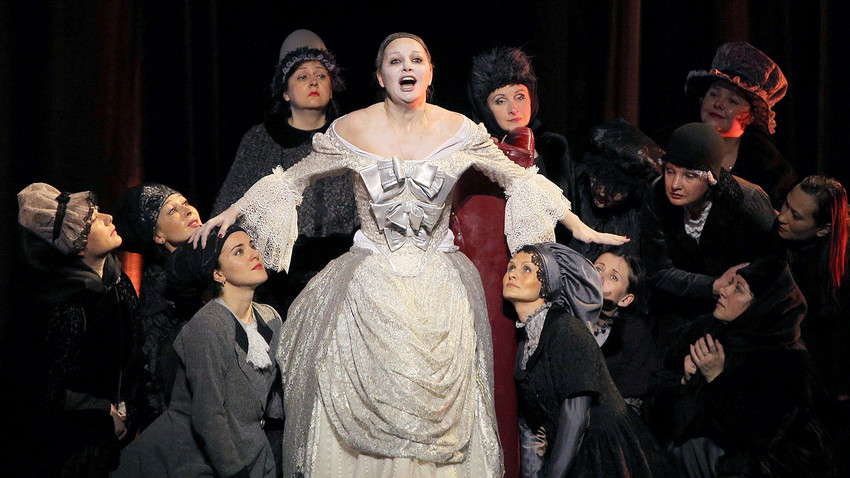
Mezzo-soprano Maria Maksakova performs Tchaikovsky's opera 'The Queen of Spades' at the Mariinsky Theater
Ruslan Shamukov/TASSRussian operas have always been difficult to perform – they require not only command of a difficult language but also powerful voices, nonstandard
In the history of Russian music Glinka is regarded as the first national composer and creator of the first Russian operas. Of course, there is a certain exaggeration in this claim. In the 18th century, music by Dmitry Bortniansky and Yevstigney Fomin were performed even in Italy. But the first Russian composers sought to master foreign traditions. Glinka appropriated it and used it to express the Russian spirit. Poet Alexander Pushkin gave Glinka the idea to write an opera based on his popular poem,
Despite the fact that the opera was much awaited, its premiere on the stage of the Bolshoi Kamenny Theater in St. Petersburg in 1842 failed to impress. Only gradually did the public come to appreciate this fairytale about life in Ancient Rus, as well as the elegance and inexhaustible variety of the melodies, the beauty of the orchestral instrumentation and the ingenuity of a large ensemble of soloists.
For more than a century Ruslan and Lyudmila
This opera has had six
Mussorgsky needed a year to compose the four-act opera in 1869, and he was devastated when the Directorate of Imperial Theaters rejected it. Five years later, after numerous changes, Boris Godunov premiered at the Bolshoi Kamenny Theater in St. Petersburg, where it also failed to garner much success.
Godunov had its triumph in 1898 when it was staged at the Solodovnikov private theater in Moscow with legendary singer Feodor Chaliapin in the main role. There was an exceptional harmony between the powerful opera and the brilliant performer. Chaliapin also triumphed in the production of Boris Godunov in Paris when Sergei Diaghilev introduced the Russian theater to Europe for the first time. Since then, Mussorgsky's opera has become a phenomenon not only in Russian music but also in world music.
In June and July 2018, it will again appear on the stage of Opéra Garnier in Paris under the baton of Russian conductor Vladimir Jurowski in a production by Belgian director Ivo van Hove.
The opera was based on the eponymous story by Pushkin. But as was the case with Tchaikovsky's earlier opera, Eugene Onegin, his brother Modest, in writing the libretto, made significant changes to the personalities and motivation of Pushkin's protagonists, and made the conflicts more in line with
The premiere took place at the Mariinsky Theater in 1890. Almost from the
In 1935, Lady Macbeth was staged in Cleveland, Philadelphia, Zurich, Buenos Aires, New York, London,
Although the composer was not arrested or shot, Lady Macbeth disappeared from the Soviet stage for a long time. While performances were held in Venice, Zagreb,
The original version of Lady Macbeth of the Mtsensk District returned to Russia in 1996 when it was staged by the Mariinsky Theater in St Petersburg. In 2004 the Bolshoi followed suit, catching up with the rest of the world, and today Shostakovich's opera remains one of the most popular in the Russian repertoire and is performed on the most prestigious stages.
The composer, who was always noted for his rapid work style, conceived War and Peace in the spring of 1941. In April 1942, the piano score was ready, and in the autumn, as the Second World War raged, work began to stage the mammoth opera at the Bolshoi Theater in 13 scenes.
The topical significance of the subject and the sheer scale of the score led to numerous revisions. The composer suggested to theaters that it be staged over two evenings, and in 1946 the first part premiered at Leningrad's Maly Opera Theater, which was known as the "laboratory of Soviet opera." But a government decree relating to Vano Muradeli's opera, The Great Friendship, blocked the staging of the second part of War and Peace. Although 1947 saw the European premiere of the original version in Prague, the composer himself did not live to see a full-scale stage performance of War and Peace.
The opera was finally staged by the Maly Opera Theater in 1955, by the Stanislavski and Nemirovich-Danchenko Music Theater in Moscow in 1957, and the Bolshoi in 1959. Although Prokofiev's epic requires dozens of solo performers and enormous choirs for the battle scenes, it is staged today the world over – from Florence and
If using any of Russia Beyond's content, partly or in full, always provide an active hyperlink to the original material.
Subscribe
to our newsletter!
Get the week's best stories straight to your inbox